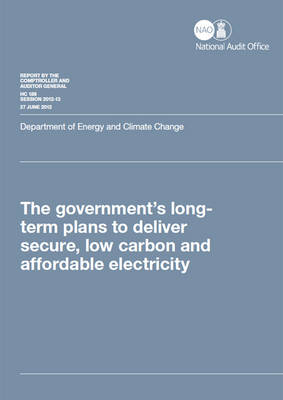
The government's long-term plans to deliver secure, low carbon and affordable electricity
Department of Energy and Climate Change
Seiten
2012
TSO (Verlag)
978-0-10-297716-5 (ISBN)
TSO (Verlag)
978-0-10-297716-5 (ISBN)
- Keine Verlagsinformationen verfügbar
- Artikel merken
This National Audit Office report has set out the long-term challenges and uncertainties involved in supplying secure, low carbon and affordable electricity. The report describes how the Department of Energy and Climate Change is seeking to address these, through existing measures and reforms to the electricity market. Existing generating capacity is some 90 gigawatts. The Department has estimated that, to maintain secure electricity supplies and avoid the risk of power cuts, around 30 gigawatts of new generating capacity will have to be built in Great Britain by 2020. This is needed to meet future increases in demand (up to 60 per cent by 2050 in some scenarios); provide back-up capacity; and because of the scheduled closure of some 19 gigawatts (21 per cent) of existing capacity over the next decade. Eight of Britain's nine nuclear power stations are scheduled to close over that period; and 12 gigawatts of fossil fuel-fired power stations will also have to close by the end of 2015. By 2020, a total of 92 gigawatts of generating capacity will be required in Britain.
The Department must also meet the statutory target to reduce UK greenhouse gas emissions by 2050 by at least 80 per cent from 1990 levels, so electricity generation needs to be largely 'decarbonised' during the 2030s. The Department estimates that GBP110 billion of investment is needed by 2020 to build low carbon generation and network infrastructure and expects that its proposed reforms to the electricity market will help to secure that investment. However, there are many uncertainties, including the impact of energy efficiency measures on future demand for electricity. The cost of the huge investment needed to secure electricity supplies and reduce greenhouse gas emissions will ultimately be passed on to consumers and business. The new market mechanisms proposed in the draft Energy Bill are designed to help address the challenges.
The Department must also meet the statutory target to reduce UK greenhouse gas emissions by 2050 by at least 80 per cent from 1990 levels, so electricity generation needs to be largely 'decarbonised' during the 2030s. The Department estimates that GBP110 billion of investment is needed by 2020 to build low carbon generation and network infrastructure and expects that its proposed reforms to the electricity market will help to secure that investment. However, there are many uncertainties, including the impact of energy efficiency measures on future demand for electricity. The cost of the huge investment needed to secure electricity supplies and reduce greenhouse gas emissions will ultimately be passed on to consumers and business. The new market mechanisms proposed in the draft Energy Bill are designed to help address the challenges.
| Erscheint lt. Verlag | 27.6.2012 |
|---|---|
| Reihe/Serie | House of Commons Papers ; 2012-13 189 |
| Zusatzinfo | col. figs, tables |
| Verlagsort | London |
| Sprache | englisch |
| Themenwelt | Technik ► Elektrotechnik / Energietechnik |
| ISBN-10 | 0-10-297716-X / 010297716X |
| ISBN-13 | 978-0-10-297716-5 / 9780102977165 |
| Zustand | Neuware |
| Informationen gemäß Produktsicherheitsverordnung (GPSR) | |
| Haben Sie eine Frage zum Produkt? |
Mehr entdecken
aus dem Bereich
aus dem Bereich
Technologie – Berechnung – Klimaschutz
Buch | Hardcover (2023)
Hanser (Verlag)
39,99 €


